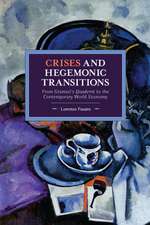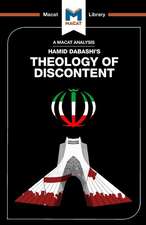An Analysis of Antonio Gramsci's Prison Notebooks: The Macat Library
Autor Lorenzo Fusaro, Jason Xidiasen Limba Engleză Hardback – 15 iul 2017
First published in 1948, 11 years after Gramsci’s death, Prison Notebooks ably demonstrates that the writer has an innate ability to understand the relationship between different parts of an argument. This is how Gramsci manages to analyze such wide-ranging topics – capitalism, economics and culture – to explain historical developments. He introduces the idea of “hegemony,” the means by which ruling classes in a society gain, keep hold of and manage their power, and, by carefully looking at how society operates, he reveals the manner in which the powerful deploy a combination of force and manipulation to convince most people that the existing social arrangement is logical and in their best interests – even when it isn’t.
Gramsci shows exactly how the ruling class maintains power by influencing both political institutions like the courts and the police, and civil institutions, such as churches, family and schools. His powerful analysis led him to the conclusion that change can only take place in two ways, either through revolution or through a slow but constant struggle to transform the belief system of the ruling classes.
| Toate formatele și edițiile | Preț | Express |
|---|---|---|
| Paperback (1) | 47.29 lei 22-36 zile | +4.85 lei 6-12 zile |
| Macat Library – 15 iul 2017 | 47.29 lei 22-36 zile | +4.85 lei 6-12 zile |
| Hardback (1) | 125.33 lei 43-57 zile | |
| Macat Library – 15 iul 2017 | 125.33 lei 43-57 zile |
Din seria The Macat Library
-
 Preț: 47.29 lei
Preț: 47.29 lei -
 Preț: 47.49 lei
Preț: 47.49 lei -
 Preț: 47.18 lei
Preț: 47.18 lei -
 Preț: 49.34 lei
Preț: 49.34 lei -
 Preț: 47.42 lei
Preț: 47.42 lei -
 Preț: 47.20 lei
Preț: 47.20 lei -
 Preț: 46.98 lei
Preț: 46.98 lei -
 Preț: 47.37 lei
Preț: 47.37 lei -
 Preț: 47.29 lei
Preț: 47.29 lei -
 Preț: 47.30 lei
Preț: 47.30 lei -
 Preț: 47.23 lei
Preț: 47.23 lei -
 Preț: 64.07 lei
Preț: 64.07 lei -
 Preț: 47.30 lei
Preț: 47.30 lei -
 Preț: 47.23 lei
Preț: 47.23 lei -
 Preț: 47.18 lei
Preț: 47.18 lei - 30%
 Preț: 32.99 lei
Preț: 32.99 lei -
 Preț: 47.13 lei
Preț: 47.13 lei -
 Preț: 47.23 lei
Preț: 47.23 lei -
 Preț: 47.26 lei
Preț: 47.26 lei -
 Preț: 47.65 lei
Preț: 47.65 lei -
 Preț: 47.37 lei
Preț: 47.37 lei -
 Preț: 47.08 lei
Preț: 47.08 lei -
 Preț: 47.18 lei
Preț: 47.18 lei -
 Preț: 47.18 lei
Preț: 47.18 lei -
 Preț: 47.27 lei
Preț: 47.27 lei -
 Preț: 47.99 lei
Preț: 47.99 lei -
 Preț: 47.23 lei
Preț: 47.23 lei -
 Preț: 47.02 lei
Preț: 47.02 lei -
 Preț: 47.23 lei
Preț: 47.23 lei -
 Preț: 47.42 lei
Preț: 47.42 lei -
 Preț: 47.30 lei
Preț: 47.30 lei -
 Preț: 47.13 lei
Preț: 47.13 lei -
 Preț: 47.10 lei
Preț: 47.10 lei -
 Preț: 47.20 lei
Preț: 47.20 lei -
 Preț: 46.98 lei
Preț: 46.98 lei -
 Preț: 47.08 lei
Preț: 47.08 lei -
 Preț: 47.29 lei
Preț: 47.29 lei -
 Preț: 47.15 lei
Preț: 47.15 lei -
 Preț: 47.29 lei
Preț: 47.29 lei -
 Preț: 64.24 lei
Preț: 64.24 lei -
 Preț: 46.98 lei
Preț: 46.98 lei -
 Preț: 47.40 lei
Preț: 47.40 lei -
 Preț: 47.87 lei
Preț: 47.87 lei -
 Preț: 47.42 lei
Preț: 47.42 lei -
 Preț: 47.18 lei
Preț: 47.18 lei -
 Preț: 47.40 lei
Preț: 47.40 lei -
 Preț: 47.40 lei
Preț: 47.40 lei -
 Preț: 46.98 lei
Preț: 46.98 lei -
 Preț: 47.20 lei
Preț: 47.20 lei -
 Preț: 47.21 lei
Preț: 47.21 lei
Preț: 125.33 lei
Preț vechi: 152.82 lei
-18% Nou
Puncte Express: 188
Preț estimativ în valută:
23.99€ • 24.95$ • 19.80£
23.99€ • 24.95$ • 19.80£
Carte tipărită la comandă
Livrare economică 14-28 aprilie
Preluare comenzi: 021 569.72.76
Specificații
ISBN-13: 9781912303267
ISBN-10: 1912303264
Pagini: 100
Dimensiuni: 129 x 198 mm
Greutate: 0.2 kg
Ediția:1
Editura: Macat Library
Colecția Macat Library
Seria The Macat Library
ISBN-10: 1912303264
Pagini: 100
Dimensiuni: 129 x 198 mm
Greutate: 0.2 kg
Ediția:1
Editura: Macat Library
Colecția Macat Library
Seria The Macat Library
Cuprins
Ways in to the Text Who was Gramsci? What does Prison Notebooks Say? Why does Prison Notebooks Matter? Section 1: Influences Module 1: The Author and the Historical Context Module 2: Academic Context Module 3: The Problem Module 4: The Author's Contribution Section 2: Ideas Module 5: Main Ideas Module 6: Secondary Ideas Module 7: Achievement Module 8: Place in the Author's Work Section 3: Impact Module 9: The First Responses Module 10: The Evolving Debate Module 11: Impact and Influence Today Module 12: Where Next? Glossary of Terms People Mentioned in the Text Works Cited
Notă biografică
Lorenzo Fusaro did his postgraduate research at King's College London and is currently a member of the Department of Economics at the Universidad Autónoma Metropolitana-Azcapotzalco.
Dr Jason Xidias has held positions at King’s College London and the University of California, Berkeley.
Dr Jason Xidias has held positions at King’s College London and the University of California, Berkeley.
Descriere
An important Marxist work, Prison Notebooks (1948) argues that we must understand societies both in terms of their economic relationships and their cultural beliefs.

























